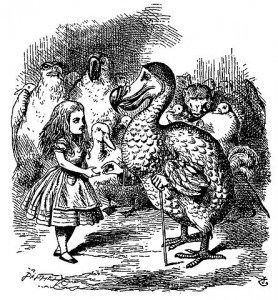The last paper that I prepared and presented (Research Conference) was fairly short and so it was around a third to half of a story which is looking at the ways in which practice and research are intrinsically related; which is the main theme I’m particularly interested in developing. A further theme concerns the ethics of the therapeutic relationship; which also links to the last paper in thinking about what kind of ethical position is created for people who become ‘ill’ and remain ‘ill’ for an extended period. The recent conference call from the UPCA on the theme of “Critical Psychotherapy and Counselling – If not now, when?” is prompting me to develop this latter idea and to perhaps think about it more carefully.
The Dodo bird verdict
There exists in the research literature of counselling and psychotherapy a number of debates around how and why talking therapies are effective. These debates and positions have emerged as a result and in response to an early paper by Saul Rosenzweig who first made the argument that all therapies are equally effective, a phenomenon that he called the Dodo-bird Verdict.

As a result of this a number of differing camps have grow up around this ‘verdict’, three such responses have been:
- specific interventions/treatments can and should be applied to alleviate specific problems that a client experiences. Treatment options are distinct and differentially effective, that is some treatments are more effective than others for certain ‘diagnoses’. The Dodo-bird Verdict is false.
- all talking therapies despite surface appearances encourage the same deeper change mechanisms and as a result can be considered largely equivalent in terms of effectiveness
- all talking therapies are equally effective, their success relies upon their specific and differing approaches and methodologies which encourages general change mechanisms.
As a result this has spawned a large and complex literature base which appears far from conclusive.
What I am particularly interested in considering is what the implications of accepting the dodo-bird effect is (position 2 above) and whether this approach is justified. I am focusing on position 2 as it appears to be the perspective largely adopted by the UKCP, the professional body for psychotherapists. One problem that I perceive with this, along with the increasing focus upon outcome measures is that it promotes a consequentialist ethics, that is that the ends justifies the means. By adopting position 2 the ethics of the helping relationship is not really considered and this is an extremely important element of any therapeutic relationship. It is around this that I am developing my abstract.
